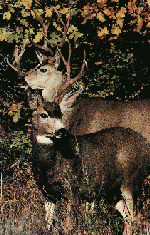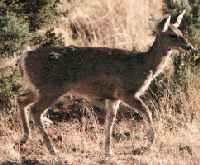White-Tail Deer - (Odocoileus virginianus)
Quiet and statuesque, both mule and white-tail deer are
difficult but exciting to see. When startled, the white-tail deer's
"flagging" of its large white tail is distinctive.
 Description: Mule deer (left) are usually a
dark gray-brown, with a small white rump patch and a small,
black-tipped tail. Their large ears are distinctive. White-tail
deer are tan in color, with a larger tail. Antlers on mule deer
tend to be larger than white-tail deer and rise up over the
head; the prongs are also forked. Prongs of white-tail antlers
are single, and grow off the main tine; they tend to grow
forward towards the eyes. Average weights are 225 and 125 pounds
(mule deer buck and doe) and 125 and 80 pounds (white-tail buck
and doe). Description: Mule deer (left) are usually a
dark gray-brown, with a small white rump patch and a small,
black-tipped tail. Their large ears are distinctive. White-tail
deer are tan in color, with a larger tail. Antlers on mule deer
tend to be larger than white-tail deer and rise up over the
head; the prongs are also forked. Prongs of white-tail antlers
are single, and grow off the main tine; they tend to grow
forward towards the eyes. Average weights are 225 and 125 pounds
(mule deer buck and doe) and 125 and 80 pounds (white-tail buck
and doe).
Habitat: Mule deer inhabit forests, desert
shrub lands, plateaus, brushy areas, and rocky uplands between 100
and 10,000 feet in elevation. They are found statewide except the
extreme southwest corner of the state. White-tail deer inhabit
moist canyons, brushy and mixed woodlands, and forest edges between
4,000 and 10,000 feet in elevation in the central and southeast
portions of the state.
 Food Preferences: Mule
deer feed on oak mast, cacti fruit, mesquite beans, mushrooms,
yucca flowers, aspen, juniper, cliffrose, sagebrush, coffeeberry,
weeds, and miscellaneous shrubs. White-tail deer (above - right)
feed on shrubs, mast, grass, mistletoe, weeds, and cacti fruit in
season. Food Preferences: Mule
deer feed on oak mast, cacti fruit, mesquite beans, mushrooms,
yucca flowers, aspen, juniper, cliffrose, sagebrush, coffeeberry,
weeds, and miscellaneous shrubs. White-tail deer (above - right)
feed on shrubs, mast, grass, mistletoe, weeds, and cacti fruit in
season.
Breeding notes: Mule deer usually breed
November-December; white-tail in January. Mule deer fawns are born
in June-August; white-tail fawns in August. The average number of
fawns per doe (both species) is two.
Predators or
Enemies: White-tail: Mountain Lion, Bobcat, Eagle, and Coyote
Mule Deer: Coyote, eagle, and mountain lion.
Size
Individual Range: White-tail: 4 square miles
Mule Deer:
30-50 square miles.
Distribution: White-tail 4,000-10,000 feet in the Central
and southeast mountains of Arizona.
Mule Deer: 9-10,000 feet,
found statewide except extreme southwest corner of Arizona.
 Information courtesy Arizona Game & Fish
Department, Region 1-Pinetop,AZ Information courtesy Arizona Game & Fish
Department, Region 1-Pinetop,AZ
|

